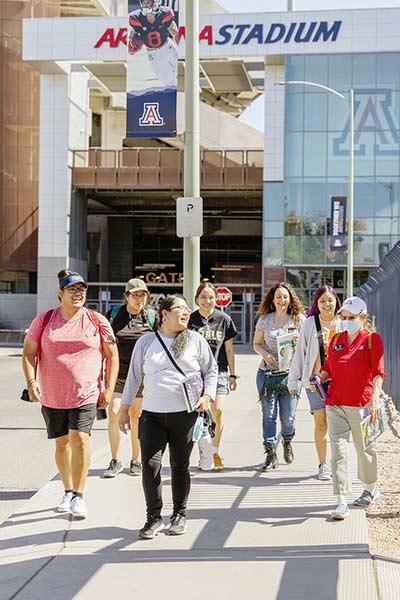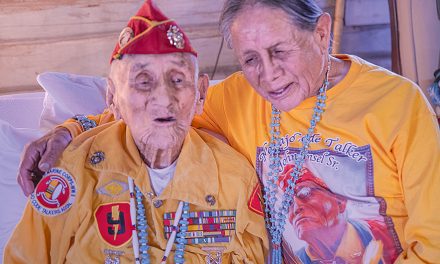
UA offers free tuition for AZ Native undergraduates
WINDOW ROCK
The University of Arizona has announced its new “Arizona Native Scholars Grant” program that will cover tuition and mandatory fees for full-time undergraduate students from Arizona’s 22 federally recognized tribes who plan study at the main Tucson campus.

University of Arizona | Chris Richards
Students from Diné College visited the University of Arizona campus in May.
According to a June 27 UA press announcement, beginning this fall, new and continuing full-time in-state Native American undergraduates will be eligible for the grant which will be administered by UA’s Enrollment Management Department.
“We wanted to bring this program forward to ensure that we are serving our Native American students and that they have all the opportunities to access higher education,” Kasey Urquídez, UA vice president of enrollment management and dean of undergraduate admissions told Navajo Times on Tuesday.
Serving Arizona’s Native American tribes and students is a key part of UA’s strategic plan that acknowledges the University’s role as a land-grant institution located on the land and territories of Indigenous people.
Tucson is home to the Tohono O’odham Nation and Pascua Yaqui Tribe.
According to the UA website, as part of its commitment to diversity and inclusion, the university builds relationships with tribes through education offerings, partnerships and community services.
“Serving Arizona’s Native American tribes and tribal students is a crucial part of the University of Arizona’s land-grant mission, and the Arizona Native Scholars Grant program is another important step among many to do that,” said University of Arizona President Robert C. Robbins.
Urquídez said resources at UA include a Native American Student Center and a Native American Alumni Club that hosts regular events and offers mentoring.
“I really feel that it’s a great place to be because of the support that’s being provided and the caring environment that we have with our leadership,” she said. “It’s definitely a very nurturing environment,”
That includes helping students realize their college dreams, said Urquidez, through a variety of support services and education programs.
For example, the Indigenous Resilience Center works with tribes on environmental challenges in ways that respect Native and Indigenous sovereignty and knowledge.
Several programs in the College of Education, including the Indigenous Teacher Education Program and Native SOAR, offer training and support for K-12 teachers in Arizona.
The college also offers one of the only undergraduate law programs in the country through the Indigenous Peoples Law and Policy Program that focuses on law, policy and human rights.
“If students are interested in working in the legal field without having a graduate law degree, we can support that opportunity,” said Urquídez.
“These initiatives aren’t checkmarks – they represent the University of Arizona’s commitment and continued drive to be the leading institution serving Native Americans,” said Levi Esquerra, UA’s senior vice president for Native American advancement and tribal engagement.
Application for admission
To be eligible for the tuition grant, students must complete the Free Application for Federal Student Aid, or FAFSA, and provide tribal verification of tribal membership.
There are no income limits as long as they are a member of a federally recognized tribe in Arizona.
“They don’t have to qualify for any of the money,” explained Urquídez. “We just want students to complete that as part of their application process.”
She said the university has admissions counselors, financial aid counselors and high school counselors who work with students to help complete their applications for admission in their senior year of high school.
Every high school in Arizona has a UA recruiter assigned to them, said Urquidez.
“We’re out there pushing the applications for admission and financial aid all year long,” she said.
Students interested in applying can call the main admissions office line (520-621-3237) to get the support they need, she said.
Urquidez said if an applicant’s tribe offers scholarship funds for college, that money would likely go on top of the tuition and fees offered by UA to cover things like living expenses.
“If the students earned a scholarship or maybe earned a Pell grant then we will come in and cover that gap so that there is no cost for tuition and fees,” she said.
Applications for the fall semester are open and the FAFSA financial aid application opens Oct. 1 every year.
Urquídez also said a lot of support is available to help students move from college to graduate school, if that’s what they would like to do.
The free tuition grant program is, however, limited to undergraduate students.
Among its many graduate programs, UA has two medical schools and a law school.
According to the American Bar Association, during the 2020-21 academic year, UA’s James E. Rogers College of Law was among the top three U.S. law schools with the highest number of Native American students.
Last year, UA was also ranked No. 1 by the National Science Foundation for doctoral degrees awarded to Native Americans.
“I think the most important thing is that we want you to be a Wildcat and graduate from the University of Arizona,” said Urquídez.
“We want to help you get there,” she said. “We have a lot of programs and services ready to go to support you in making that transition and getting to that goal.”
Information: https://financialaid.arizona.edu/types-of-aid/indigenous-wildcats








 Highway 264,
Highway 264, I-40, WB @ Winslow
I-40, WB @ Winslow